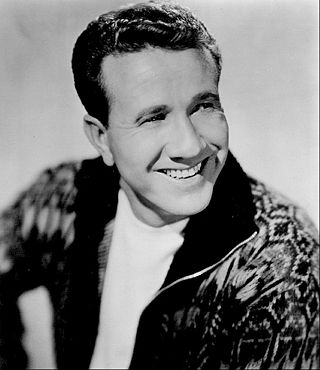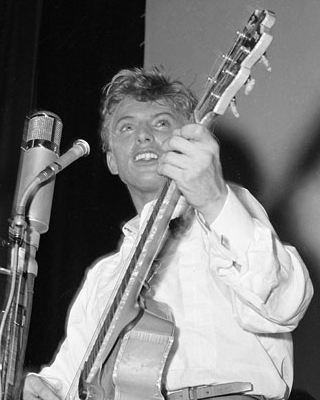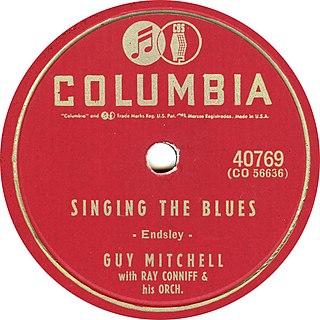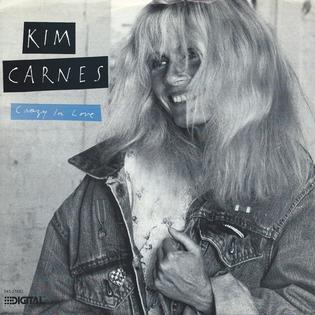Related Research Articles

Martin David Robinson, known professionally as Marty Robbins, was an American singer, songwriter, multi-instrumentalist, and NASCAR racing driver. Robbins was one of the most popular and successful country and western singers for most of his nearly four-decade career, which spanned from the late 1940s to the early 1980s. He was also an early outlaw country pioneer.

Sir Thomas Hicks, known professionally as Tommy Steele, is an English entertainer, regarded as Britain's first teen idol and rock and roll star.

David William Edmunds is a Welsh singer-songwriter, guitarist and record producer. Although he is mainly associated with pub rock and new wave, having many hits in the 1970s and early 1980s, his natural leaning has always been towards 1950s-style rock and roll and rockabilly.

Connie Smith is an American country music singer and songwriter. Her contralto vocals have been described by music writers as significant and influential to the women of country music. A similarity has been noted between her vocal style and the stylings of country vocalist Patsy Cline. Other performers have cited Smith as influence on their own singing styles, which has been reflected in quotes and interviews over the years.

Marty Wilde, is a British singer and actor. He was among the first generation of British pop stars to emulate American rock and roll, scoring several 1950s and 1960s hit singles including "Endless Sleep", "Sea of Love" and "Bad Boy". During the late 1960s to early 1980s, Wilde continued to record and, with Ronnie Scott, co-wrote hit singles for others including the Casuals' "Jesamine" and Status Quo's "Ice in the Sun". He is the father of pop singer Kim Wilde and co-wrote many of her hit singles including "Kids in America" with his son Ricky. He continues to perform and record.

"Singing the Blues" is a popular song composed by Melvin Endsley and published in 1956. The highest-charting version was by Guy Mitchell and the first recording of the song was by Marty Robbins. It is not related to the 1920 jazz song "Singin' the Blues" recorded by Frank Trumbauer and Bix Beiderbecke in 1927.

"Angel of the Morning" is a popular song written by Chip Taylor, originally recorded by Evie Sands but which first charted with a version by Merrilee Rush. The song has been covered by many artists including Chrissie Hynde, Dusty Springfield, P. P. Arnold, Connie Eaton, Mary Mason, Guys 'n' Dolls, Melba Montgomery, Olivia Newton-John and most recognizably by Juice Newton.

Jeffrey LeVasseur, known as Jeffrey Steele, is an American country music singer and songwriter. Along with recording his own material, Steele has become a prolific Nashville songwriter, having co-written more than 60 hit songs for such artists as Montgomery Gentry, Tim McGraw, Faith Hill, LeAnn Rimes, Rascal Flatts, Billy Ray Cyrus, and others.
"The Story of My Life" is a song written by Burt Bacharach and Hal David. It was published in 1957. It was recorded by Marty Robbins and reached number one on Billboard's country chart in 1958, and it became a number one hit song for Michael Holliday in the UK.

"A White Sport Coat (And A Pink Carnation)" is a 1957 country and western song with words and music both written by Marty Robbins. It was recorded on January 25, 1957, and released on the Columbia Records label on March 4. The arranger and recording session conductor was Ray Conniff, an in-house conductor/arranger at Columbia. Robbins had demanded to have Conniff oversee the recording after his earlier hit, "Singing the Blues", had been quickly eclipsed on the charts by Guy Mitchell's cover version, which was scored and conducted by Conniff in October 1956.
"You Gave Me a Mountain" is a song written by country singer-songwriter Marty Robbins during the 1960s. It has been recorded by many artists, including Robbins himself, but the highest-charting version of the song was by Frankie Laine in 1969. This version was included on Laine's album of the same name.
Devil Woman is a song written and recorded by American country music artist Marty Robbins. It was released in June 1962 as the first single and title track from the album Devil Woman. It was also Robbins' seventh single to reach number one on the country chart, spending eight weeks at the top spot. "Devil Woman" also crossed over onto the pop chart, peaking at number sixteen. Overseas, "Devil Woman" was Robbins' most successful single on the UK charts.
"Take These Chains from My Heart" is a song by Hank Williams. It was written by Fred Rose and Hy Heath and was recorded at Williams' final recording session on September 23, 1952, in Nashville. The song has been widely praised; Williams' biographer Colin Escott deems it "perhaps the best song [Rose] ever presented to Hank...It was one of the very few songs that sounded somewhat similar to a Hank Williams song." Williams is backed by Tommy Jackson (fiddle), Don Helms, Chet Atkins, Jack Shook, and Floyd "Lightnin'" Chance (bass). In the wake of Williams' death on New Year's Day, 1953, the song shot to No. 1, his final chart-topping hit for MGM Records. Like "Your Cheatin' Heart," the song's theme of despair, so vividly articulated by Williams' typically impassioned singing, reinforced the image of Hank as a tortured, mythic figure.
"I Walk Alone" is a song written by Herbert Wilson. and recorded by American country music artist, Eddy Arnold and was the B-side of his 78 rpm single "Did You See My Daddy Over There" (1945), and later for his compilation album Eddy Arnold Sings Them Again (1960).

"Crazy in Love" is a song by songwriters Even Stevens and Randy McCormick; it was first recorded by Joe Cocker on his 1984 album Civilized Man. The song was covered by American pop artist Kim Carnes in 1988 and released as the second single from her album View from the House. Carnes' version peaked at number 13 on the Billboard Adult Contemporary chart and number 68 on the Billboard Hot Country Singles & Tracks chart.

"Big Iron" is a country ballad written and performed by Marty Robbins, originally released as an album track on Gunfighter Ballads and Trail Songs in September 1959, then as a single in February 1960 with the song "Saddle Tramp" as the B-side single. Members of the Western Writers of America chose it as one of the Top 100 Western songs of all time.
Melvin Endsley was a musician, singer, and songwriter best known for writing the song "Singing the Blues", along with over 400 songs recorded by hundreds of artists since 1956. Some of the artists that have recorded his songs include Johnny Cash, Marty Robbins, Andy Williams, Paul McCartney, Stonewall Jackson, and Ricky Skaggs. At the beginning of his career, Endsley recorded including RCA and MGM, however, his vocal recordings were commercially unsuccessful. In 1998, he was inducted into the Arkansas Entertainers Hall of Fame.
"Return to Me" is a song with music by Carmen Lombardo and lyrics by Danny Di Minno. The song was released in 1958 by Dean Martin. Martin recorded the song again in 1961 for his album Dino: Italian Love Songs.

Charley is the twentieth studio album by American country music artist Charley Pride. It was released in May 1975 via RCA Victor Records and was produced by Jack Clement. The record was Pride's twentieth studio album released in his career and contained a total of ten tracks. The album included two singles which became major hits that year on the country chart: "I Ain't All Bad" and "Hope You're Feelin' Me ."
References
- ↑ "Marty Robbins | Biography, Albums, Streaming Links". AllMusic . Retrieved 27 April 2021.
- ↑ "Guy Mitchell | Biography, Albums, Streaming Links". AllMusic . Retrieved 27 April 2021.
- ↑ Roberts, David (2006). British Hit Singles & Albums (19th ed.). London: Guinness World Records Limited. pp. 371–372. ISBN 1-904994-10-5.
- ↑ Tommy Steele Discography Archived 2011-09-30 at the Wayback Machine Accessed September 2011.